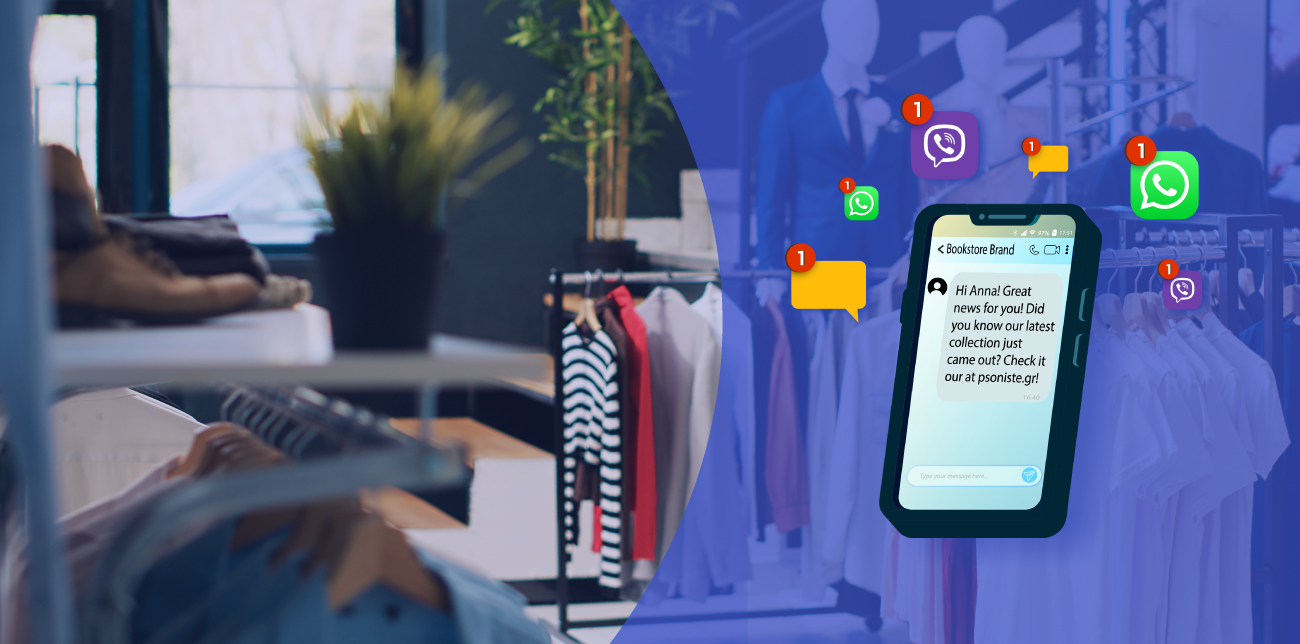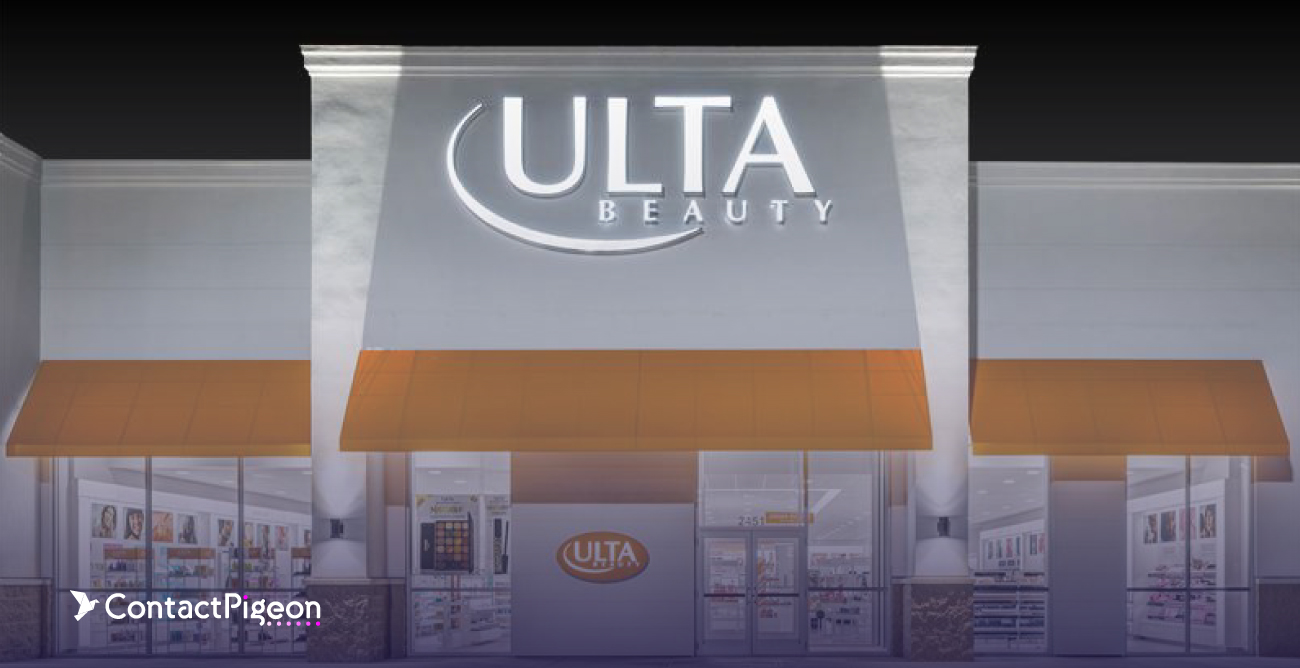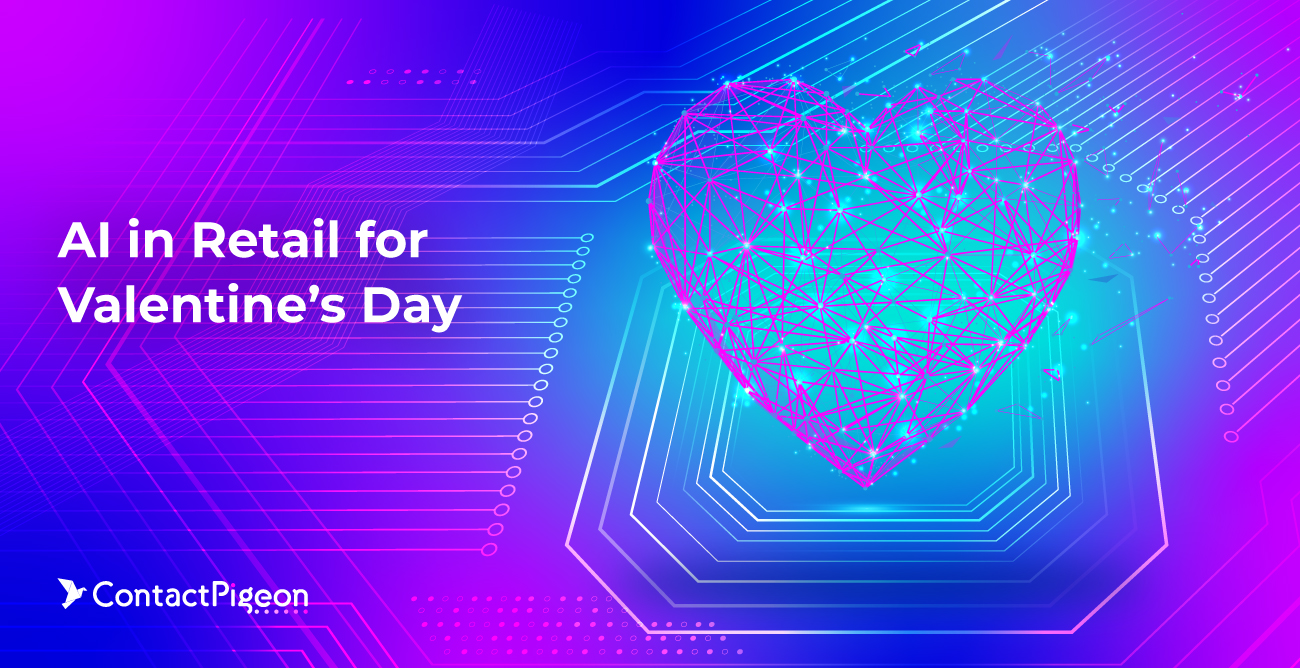Let’s break down the key points:
-
Personalized messaging across SMS, Viber, and WhatsApp significantly boosts engagement and conversions, with SMS open rates reaching 98% and average conversion rates between 21–30%, making it a powerful channel in retail marketing.
-
Effective personalization starts with robust customer data, segmentation by behavior or demographics, and crafting timely, relevant messages with clear CTAs—supported by automation and continuous A/B testing.
-
Each platform offers unique strengths: SMS excels in broad reach, Viber enhances engagement with rich media and interactivity, and WhatsApp supports conversational, relationship-driven messaging through APIs and interactive templates.
-
Success stories from brands like Kiehl’s, IKEA, and Coca-Cola HBC Bulgaria showcase the power of location-based targeting, interactive Viber bots, and personalized offers in driving foot traffic, redemptions, and conversions.
-
ContactPigeon’s CDP empowers omnichannel personalization by unifying customer data, automating campaign triggers, enabling granular segmentation, and providing real-time analytics across SMS, Viber, and WhatsApp.
Personalized marketing is a game-changer for the dynamic world of retail, and SMS personalization has become a crucial strategy for businesses aiming to enhance customer engagement and drive sales. Retailers can create meaningful connections that drive engagement and sales by sending tailored messages directly to customers’ phones. With widespread industry adoption, an impressive 84% of the eCommerce and retail industry have already embraced SMS and text marketing campaigns.
This blog post aims to equip retailers with the best practices for effectively implementing SMS/Viber and WhatsApp personalization. For readers, this means gaining actionable insights to enhance your marketing efforts, foster stronger customer connections, and ultimately, achieve greater business success.
Personalized SMS/Viber/WhatsApp marketing: Understanding the importance of personalization in messaging
Customers today expect communications that are relevant and tailored to their interests. Personalized messaging meets this demand by delivering content that resonates on a personal level, thereby increasing the likelihood of engagement and conversion.
When messages are personalized, customers feel valued and understood, fostering a stronger connection with the brand. This approach not only enhances customer satisfaction but also drives significant business results. Personalized messages stand out in a crowded digital landscape, capturing the attention of customers who are bombarded with generic marketing content daily.
Why personalization matters
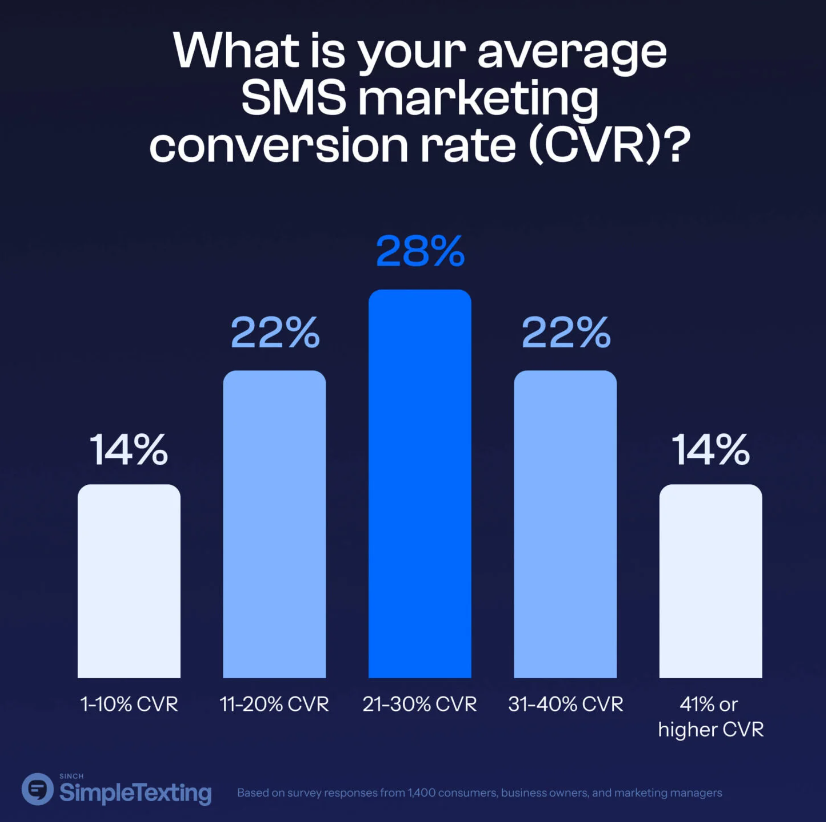
With SMS, Viber, or WhatsApp marketing strategies, you can create a more engaging and effective communication channel, ultimately leading to improved business outcomes. Here are some key findings:
- Increased engagement: Personalized SMS campaigns have a 98% open rate and a 10.66% click-through rate, which is much higher compared to traditional email marketing.
- Customer preference: 64% of consumers believe businesses should reach out to them more frequently through SMS, highlighting the channel’s popularity.
- Effective campaigns: Most businesses see an average conversion rate between 21 and 30% for SMS marketing, with an opt-out rate as low as 1% to 2%, indicating that customers are not only opening but also engaging with these messages.
Best practices for SMS personalization
To fully harness the power of SMS personalization in marketing, retailers need to follow best practices that ensure messages are both relevant and impactful. Here are some key strategies:
Collect and utilize customer data
The foundation of effective personalization is collecting and analyzing robust customer data.
Instructions:
- Gather data through CDPs, customer surveys, and social media interactions.
- Segment customers based on purchase frequency, preferences, and demographics to boost SMS personalization.
Craft compelling and relevant messages
Your messages should be concise, clear, and directly relevant to the recipient.
Instructions:
- Personalize greetings with the customer’s name.
- Reference past purchases or browsing history.
- Highlight special offers or new products relevant to their interests. and utilize predictive insights.
Timing is key
Send messages at times when they are most likely to be read and acted upon. Consider your audience’s habits and location to optimize open and response rates.
Instructions:
- SMS personalization includes scheduling messages during peak engagement times, such as early evenings.
- Avoid sending messages during inconvenient hours, like late at night or early morning, to prevent opt-outs.
- Use time zone data to ensure messages are sent at appropriate times for each customer.
Include clear CTAs
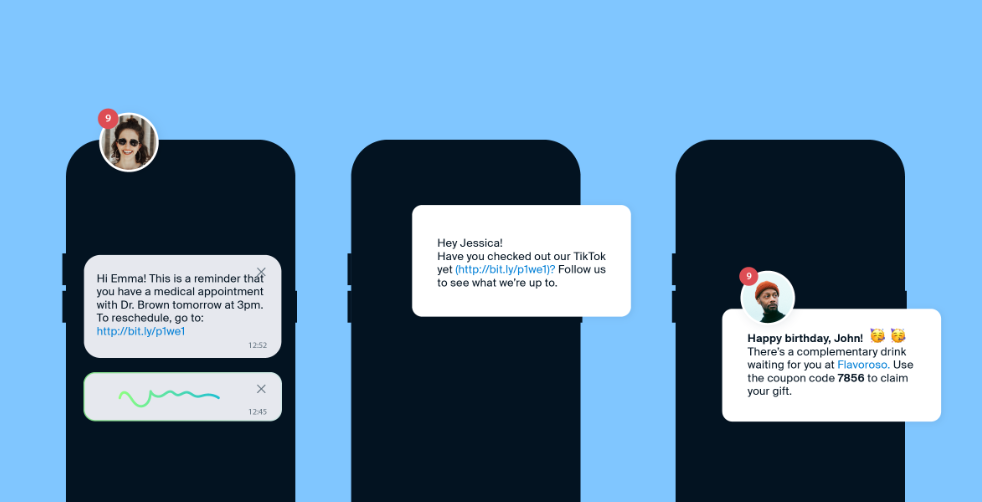
Every message should have a clear and compelling call to action, whether it’s a discount code, a link to a new product, or an invitation to an event.
Instructions:
- Use actionable language like “Shop Now,” “Get Your Discount,” or “Learn More.”
- Provide direct links to products or offers.
- Keep CTAs simple and easy to follow.
Test and optimize
Continuously test different elements of your SMS campaigns for better outcomes. Monitor your data to refine your strategy.
Instructions:
- Conduct A/B tests on message content, send times, and frequencies.
- Analyze open rates, click-through rates, and conversion rates to identify what works best.
- Adjust strategies based on test results to improve performance.
Respect privacy and compliance
Always obtain explicit consent from customers before sending SMS messages. Ensure that your campaigns comply with relevant regulations and provide easy opt-out options to respect customer preferences.
Instructions:
- Ensure customers opt-in to receive SMS messages.
- Inform customers how their data will be used before providing you with their contact information.
- Stay updated on and comply with regulations such as GDPR and TCPA.
Attention-grabbing SMS personalized examples
- Hi Anna, are you ready for an exciting summer? Get 25% off all sunscreens with code SUMMER25.
- Hey Faye, need a wardrobe refresh? Get 20% off all new arrivals. Use code NEW20 at checkout!
- Hello Emily, your perfect look awaits with exclusive early access to our sale! Shop now and save up to 40%: [Link]
- Hey Matthew, check out our bestsellers, hand-picked for you! Grab them before they’re gone: [Link]
- Hi Joanna, we’ve curated some picks just for you! Explore now and enjoy 15% off: [Link]
- Hi Anastasia, as a valued customer, enjoy 20% off your next purchase with code THANKYOU20!
- Hello Irene, we noticed you left something behind. Complete your purchase now and get 10% off: [Link]
- Hey George, we miss you! Come back and enjoy 15% off your next order with code WELCOME15.
Ready-made ChatGPT prompts for personalized SMS messages
- “Create a personalized SMS for a customer named [Customer Name] who recently viewed [Product] but didn’t complete the purchase. Max Length: 160 characters”
- “Generate a personalized SMS for [Customer Name] offering a special discount on their favorite product, [Product]. Max Length: 160 characters”
- “Write a personalized thank-you SMS for [Customer Name] who has just made their first purchase from our store. Max Length: 160 characters”
- “Generate a personalized birthday SMS for [Customer Name] offering a special birthday discount. Max Length: 160 characters”
- “Create a personalized SMS for [Customer Name] who has items in their wishlist that are now on sale. Max Length: 160 characters”
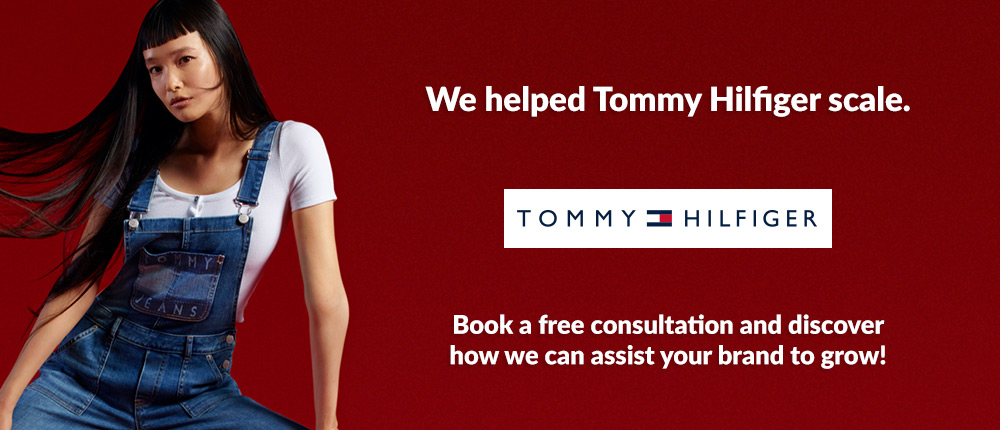
Best Practices for Viber Personalization

Personalizing your Viber marketing campaigns can significantly enhance customer engagement and satisfaction. Here are some key strategies to ensure your Viber messages resonate with your audience:
Utilize rich media content
Rich media content can make your Viber messages more engaging and visually appealing. Tailoring media content to align with customer interests adds a personalized touch that captures attention and encourages interaction.
Instructions:
- Use personalized images, videos, or GIFs that align with customer preferences.
- Use visually appealing templates to make messages more engaging.
Leverage interactive features

Viber’s interactive features allow for direct customer engagement. These features make the interaction more dynamic and provide valuable insights into customer preferences and opinions.
Instructions:
- Use Viber’s interactive buttons to create polls, quizzes, or quick reply options.
- Encourage customer interaction through surveys or feedback forms.
Provide value-added content
Offering value-added content enhances the customer experience and maintains brand loyalty. Personalized recommendations based on past interactions make customers feel valued and understood.
Instructions:
- Share exclusive deals, insider news, or loyalty rewards specific to the customer’s preferences.
- Offer personalized recommendations based on past interactions.
Maintain a consistent brand voice
A consistent voice builds trust and credibility as customers know what to expect from your communications. A stronger emotional connection with your audience enhances loyalty and distinguishes your brand from competitors.
Instructions:
- Ensure all messages reflect your brand’s tone and style consistently.
- Use friendly and conversational language to build rapport.
Track and analyze performance

Monitoring engagement allows you to refine your messaging strategy. Use these insights to continually improve the effectiveness of your Viber campaigns.
Instructions:
- Monitor engagement metrics such as read rates and click-through rates.
- Adjust your strategies based on the insights gained from performance data.
Respect Viber’s policies
Like SMS, respecting customer privacy and ensuring compliance with relevant regulations is crucial for Viber campaigns. Familiarize yourself with Viber’s guidelines to avoid any issues with your campaigns.
Instructions:
- Obtain explicit consent from customers before sending Viber messages.
- Communicate how customers can manage their subscription preferences.
- Comply with relevant data protection regulations.
Attention-grabbing Viber personalized examples
- [Customer Name], ✨ You’re in! ✨ Get early access to our summer collection with this special code: [Code]. [Link with Preview Image]
- [Customer Name], our stylists handpicked this [Product Name] just for you! See why it’s perfect: [Link to Product Video]
- [Customer Name], your cart is feeling a little lonely. 🥺 Complete your order and let’s get those goodies to you! [Link]
- Happy Birthday, [Customer Name]! 🎉 Celebrate with [Discount]% off your favorite items today! [Link to GIF of Confetti]
- Congrats, [Customer Name]! You’ve leveled up in our loyalty program! Claim your reward in our Viber Community: [Link]
- [Customer Name], near our [Store Location]? Vote in our poll to unlock a special offer just for you! [Link to Poll]
- Hey [Customer Name], how’s your [Product Name]? Rate your experience and help us improve! [Link to Quick Survey]
- [Customer Name], ⏳ Flash sale ending soon! Grab [Discount]% off everything until midnight! [Link with Countdown Sticker]
ChatGPT prompts for personalization Viber messages
- “Generate 3-5 personalized Viber messages for a customer named [Customer Name] who recently viewed [Product] but didn’t complete the purchase at [Your Website here]. Max Length: 7,000 characters. Use emojis to increase engagement.”
- “Create a personalized Viber message for [Customer Name] offering a special discount on their favorite product, [Product]. Max Length: 7,000 characters. Use emojis to increase engagement.”
- “Write a personalized thank you message for [Customer Name] who has just made their first purchase from your store. Max Length: 7,000 characters. Use emojis to increase engagement.”
- “Generate a personalized birthday message for [Customer Name] offering a special birthday discount. Max Length: 7,000 characters. Use emojis to increase engagement.”
- “Create a personalized message for [Customer Name] who has items in their wishlist that are now on sale. Max Length: 7,000 characters. Use emojis to increase engagement.”
Best practices for WhatsApp personalization

Utilize WhatsApp effectively for personalized customer interactions, enhancing engagement and driving sales. Here are some best practices for WhatsApp personalization:
Use customer names and purchase history
Personalizing messages with customer names and referencing past purchases can create a more engaging experience.
Instructions:
- Integrate with WhatsApp Business API to automatically pull customer names and recent purchases into messages.
- Use tags in message templates to insert these details dynamically.
Segment your audience
Grouping customers based on behavior, demographics, or preferences ensures that messages are relevant to each segment.
Instructions:
- Analyze customer data to create segments.
- Use WhatsApp’s list feature to organize contacts and tailor messages for each segment, ensuring content is highly relevant.
Timing and frequency of messages
Sending messages at the right time and frequency prevents annoyance and increases the chances of engagement.
Instructions:
- Study customer interaction times and schedule messages accordingly.
- Use automation tools to send messages at optimal times and limit frequency to avoid spamming.
Use interactive messages

Incorporating interactive elements enhances user engagement. These elements can guide customers to take immediate actions like purchasing or getting more information.
Instructions:
- Use WhatsApp Business API to create interactive messages with buttons for quick replies, images, and videos.
Personalized offers and discounts
Offering personalized discounts and promotions based on customer behavior can boost sales.
Instructions:
- Track customer purchase patterns and preferences.
- Create personalized offers using this data and send them through WhatsApp, ensuring they are relevant and timely.
Feedback and surveys
Gathering feedback through personalized surveys helps in understanding customer satisfaction and areas of improvement.
Instructions:
- Design personalized survey messages and use WhatsApp Business API to send them.
- Automate responses to follow up on feedback and take necessary actions based on customer responses.
Attention-grabbing WhatsApp personalized examples
- [Customer Name], 🤫 You’re in on a secret! Get early access to our summer collection before anyone else. [Link]
- [Customer Name], we noticed you liked [Previous Purchase]. Check out this similar [Product Name] you might love! [Link]
- [Customer Name], don’t forget those awesome items in your cart! 😉 Complete your purchase here: [Link]
- Happy Birthday, [Customer Name]! 🎂 Enjoy [Discount]% off anything you like today as our gift to you. [Link]
- You’re a VIP, [Customer Name]! 🙌 That means you’ve earned a special reward. Claim it here: [Link]
- [Customer Name], great news! The [Product Name] you wanted is back in stock. Hurry and grab it before it’s gone again! [Link]
- [Customer Name], you’re personally invited to our exclusive event on [Date]. Secure your spot now: [Link]
ChatGPT prompts for personalized WhatsApp messages

- “Write a personalized WhatsApp message for [Customer Name] inviting them to check out our new arrivals in the [Category] section. Max Length 1024 characters”
- “Generate a personalized WhatsApp message for [Customer Name] offering free shipping on their next order. Max Length 1024 characters”
- “Create a personalized WhatsApp message for [Customer Name] thanking them for being a loyal customer and offering a special loyalty discount. Max Length 1024 characters”
- “Write a personalized WhatsApp message for [Customer Name] informing them about a flash sale on products they have previously purchased. Max Length 1024 characters”
- “Generate a personalized WhatsApp message for [Customer Name] offering a discount on complementary products to their recent purchase of [Product]. Max Length 1024 characters”
Combining SMS, Viber, and WhatsApp for a unified experience
While each messaging platform has unique strengths, combining SMS personalization, with Viber, and WhatsApp can create a powerful, unified customer experience that maximizes your marketing reach. Here are some strategies to integrate these platforms seamlessly:
Omnichannel strategy
- Centralized management: Use platforms that allow you to manage all three channels from one dashboard. This simplifies campaign creation, message scheduling, and performance tracking.
- Consistent branding: Ensure your brand voice, tone, and visuals remain consistent across all messaging platforms. This reinforces brand identity and builds familiarity.
- Seamless transitions: Enable customers to switch between platforms effortlessly. For example, allow them to opt-in for WhatsApp notifications after receiving an SMS, or vice-versa.
Targeted messaging
- SMS personalization for broad reach: Use SMS for mass notifications, urgent alerts, or reaching customers who might not use Viber or WhatsApp.
- Viber for rich media: Leverage Viber’s rich media capabilities to send engaging content like images, videos, and interactive polls.
- WhatsApp for personalized communication: Use WhatsApp for personalized conversations, customer support, and building stronger relationships.
Data-driven insights

- Unified analytics: Track and analyze performance metrics across all three channels to identify trends, optimize campaigns, and understand customer preferences.
- Cross-channel segmentation: Segment your audience based on their preferred platform and tailor messages accordingly.
- Behavioral tracking: Monitor customer interactions across platforms to create personalized journeys and targeted offers.
Integrated campaigns
- Cross-promotion: Promote your Viber and WhatsApp channels in SMS messages, and vice versa. Offer incentives for customers to join all platforms.
- Coordinated campaigns: Launch campaigns that leverage the strengths of each platform. For example, use SMS for initial outreach, Viber for engaging content, and WhatsApp for personalized follow-ups.
- Consistent offers: Ensure that promotions and discounts are consistent across all platforms to avoid confusion and maintain brand integrity.
Key metrics to track for Viber/SMS and WhatsApp campaigns
Tracking the right metrics is crucial to understanding the success of your Viber, SMS, and WhatsApp campaigns. Here’s a breakdown of the most important metrics for each platform:
Viber
- Delivery rate
- Open rate
- Click-through rate (CTR)
- Conversion rate
- Engagement rate
- Sticker pack downloads
SMS
- Delivery rate (same as Viber)
- Response rate (relevant for SMS campaigns that encourage two-way communication)
- Opt-out rate
- Conversion rate (same as Viber)
- Delivery rate
- Open rate
- Reply rate
- Conversion rate
- Status views
Success stories of SMS, Viber & WhatsApp personalization campaigns in retail
Retailer success story #1: How Kiehl’s location-based SMS drove a 73% offer redemption rate
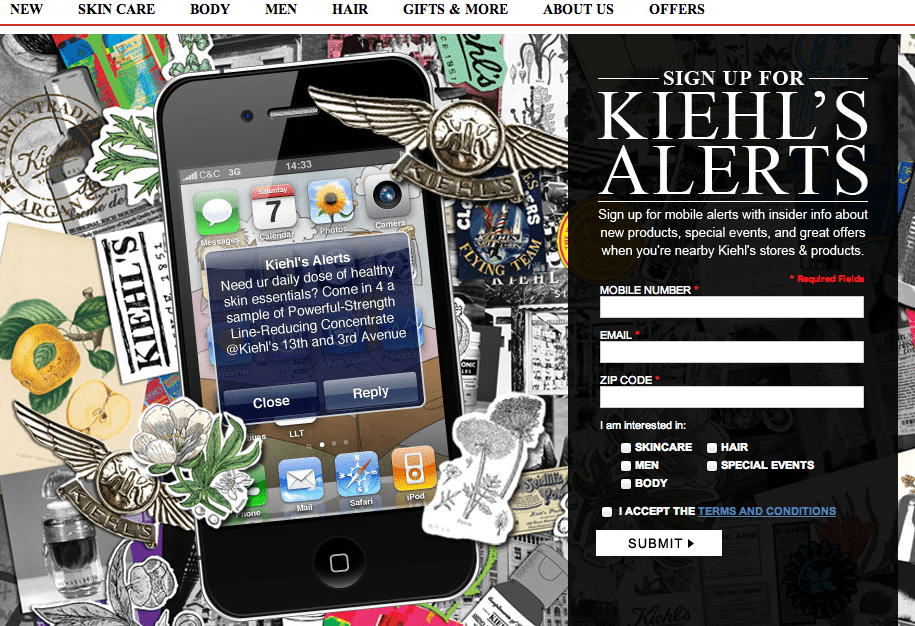
Strategy: Kiehl’s implemented a location-based SMS marketing campaign, and encouraged customers to opt-in for SMS alerts by offering incentives like exclusive discounts and promotions. Once opted in, customers received up to three location-based text alerts per month, enticing them to visit the nearest Kiehl’s store.
Results: Kiehl’s six-month SMS pilot program proved highly successful, with 73% of subscribers making a purchase. Additionally, their survey revealed strong brand recall, with 81% of respondents remembering receiving Kiehl’s text messages. This suggests that 9 out of 10 customers who recalled the SMS campaign ultimately bought something in-store, showcasing the effectiveness of SMS marketing in driving sales.
Retailer success story #2: How IKEA’s SMS campaign led to +11% increase in in-store foot traffic
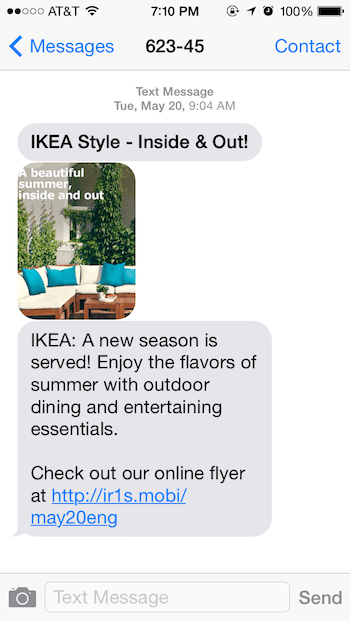
Strategy: IKEA implemented a multi-faceted SMS campaign that included enticing customers to join their mobile club through SMS opt-ins. They utilized location-based targeting to send personalized offers and promotions to members when they were in proximity to an IKEA store, driving foot traffic. This campaign was likely further amplified through “website advertising” and in-store kiosks to promote the mobile club and drive SMS signups.
Results: This strategic combination of SMS marketing and location-based targeting resulted in an impressive 11% increase in in-store foot traffic, showcasing the power of mobile messaging to drive customer engagement and physical store visits.
Retailer success story #3: How Coca-Cola HBC Bulgaria leveraged Viber’s features

Strategy: Coca-Cola HBC Bulgaria utilized Viber’s chatbot capabilities to create an engaging and interactive campaign. Through the chatbot, users could participate in quizzes, play games, and win instant prizes, all while learning more about Coca-Cola products and promotions.
Results: The Viber campaign exceeded expectations, garnering over 191,000 sticker pack downloads and 184,000 chatbot subscribers. With 29,000 cap codes redeemed and an impressive 30% conversion rate, the campaign surpassed industry averages tenfold, showcasing the power of engaging content and interactive features on the Viber platform.
How ContactPigeon’s CDP assists with retail SMS personalization

Leveraging ContactPigeon’s CDP, retailers can enhance their SMS personalization efforts, resulting in more effective customer engagement and higher conversion rates.
- Unified customer data: Use the CDP to gather and integrate data from various touchpoints like online interactions, purchase history, and engagement across SMS, Viber, and WhatsApp, ensuring a comprehensive view of each customer.
- Automated campaigns: Automate SMS/Viber and WhatsApp marketing campaigns with triggers based on customer actions (e.g., abandoned cart, new purchase) to automatically send personalized follow-up messages. Use the CDP to analyze customer behavior and refine your automation rules for optimal engagement.
- Segmentation and personalization: Leverage the CRM integration to segment your contacts and pull in personalized data such as customer names, recent purchases, and browsing history. Automate the process of sending tailored messages using dynamic fields in your SMS templates.
- Integration with other channels: Coordinate your SMS campaigns with Viber and WhatsApp messaging efforts. Ensure consistency in messaging across all channels to provide a seamless customer experience.
- Real-time analytics, pre-built eCommerce dashboards, and customized data models: Access detailed analytics and reports provided by the CDP to track key metrics like open rates, click-through rates, and conversion rates. Customize your dashboards to use these insights and improve your SMS personalization strategies.
Ready to transform your SMS marketing with ContactPigeon’s powerful CDP? Schedule a personalized demo to see how our platform can enhance your customer engagement and drive sales.
Book your demo today and start personalizing your retail SMS/Viber and WhatsApp campaigns like never before!
The future of personalization in retail messaging
Personalized messaging is revolutionizing retail marketing by enhancing customer engagement and driving sales. Key takeaways include the importance of a consistent brand voice, segmented messaging, and utilizing the strengths of SMS, Viber, and WhatsApp. By adopting these best practices, retailers can create a seamless and personalized customer experience, ensuring they stay competitive in a dynamic market. Start implementing these strategies today to build stronger connections with your customers and foster long-term loyalty.
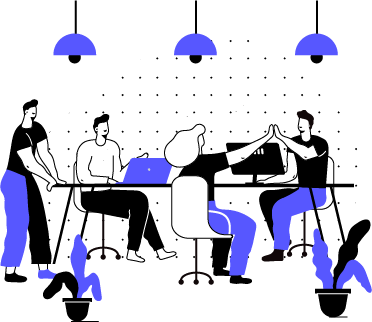
Let’s Help You Scale Up
Frequently asked questions
Why is personalization so critical for SMS, Viber, and WhatsApp marketing in retail?
Personalization is essential because today’s consumers expect tailored, relevant communication that aligns with their preferences and behaviors. Personalized messages via SMS, Viber, and WhatsApp significantly boost engagement, open rates (SMS reaches up to 98%), and conversion rates (21–30% on average). By using customer names, past purchases, and behavior-based segmentation, retailers can make customers feel valued—driving loyalty, satisfaction, and ultimately, higher sales.
What are the key best practices for creating personalized messages across SMS, Viber, and WhatsApp?
The most effective practices include:
-
Segmenting your audience based on behavior, preferences, and demographics.
-
Using customer data (e.g., names, past purchases, location) to tailor content.
-
Timing your messages based on engagement trends and time zones.
-
Incorporating rich media and interactive elements (especially on Viber and WhatsApp) like buttons, polls, or videos.
-
Including clear CTAs to drive action.
-
Testing and optimizing campaigns continuously using A/B testing and analytics.
-
Ensuring privacy and compliance with GDPR, TCPA, and platform-specific guidelines.
How can retailers manage and unify personalization efforts across SMS, Viber, and WhatsApp?
Retailers can create a unified, omnichannel messaging experience by using platforms like ContactPigeon’s CDP. This enables centralized campaign management, consistent branding, behavioral tracking, and integrated analytics across all channels. Campaigns can be automated and segmented based on customer behavior, ensuring that each message—whether SMS, Viber, or WhatsApp—is relevant and timely. This holistic approach maximizes marketing impact and ensures a seamless customer journey.

